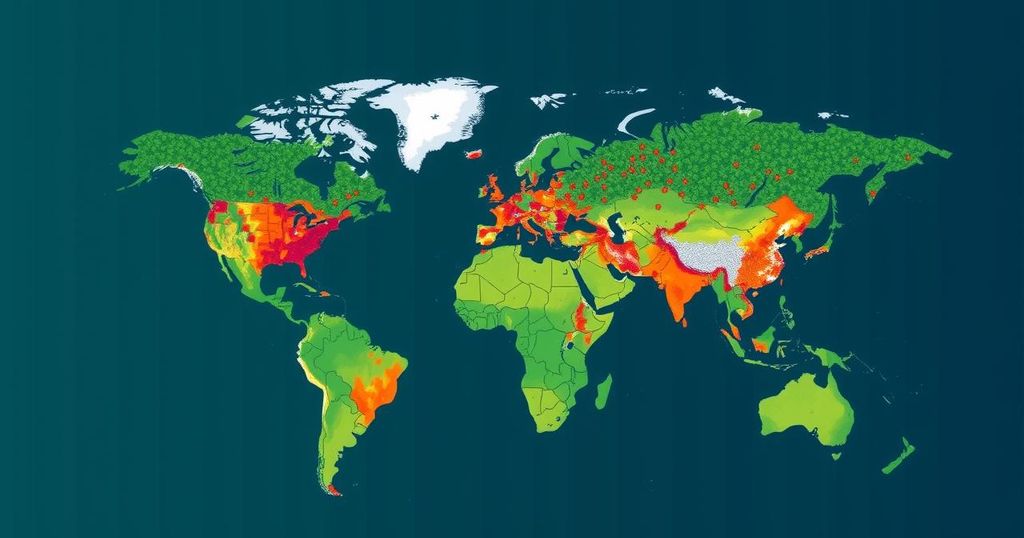Global Elections 2024: A Troubling Shift Away from Climate Action
The 2024 election year has demonstrated a worrying decline in global commitment to climate action, despite increasing climate crises. Major electoral victories for climate-skeptical leaders highlight a shift in political priorities towards short-term economic issues. This trend raises concerns about future efforts to combat climate change, particularly in light of disheartening performances at climate summits.
An unprecedented global election year in 2024 has illuminated a disheartening trend: the commitment to address the climate crisis appears to be faltering in numerous countries. This year, characterized as the “biggest election year in human history” by the United Nations, has seen significant victories for politicians skeptical of climate concerns, such as Donald Trump, the president-elect of the United States, Vladimir Putin, and various right-wing parties in European elections. Catherine Fieschi, a European politics expert, notes that while climate was once a priority, it has largely receded from public discourse, overshadowed by immediate concerns like inflation and energy prices.
Despite climate events intensifying globally, including record heat and floods, electoral discussions largely neglected the climate crisis, except in certain regions like India. Here, extreme weather challenges helped shape the political landscape as Narendra Modi secured a third term amidst farmer protests. In Europe and the U.S., right-leaning parties that framed environmental action as unnecessarily costly gained traction. However, not all regions displayed this retreat; for instance, the Labour Party’s success in the UK and unexpected right-wing defeats in France suggest varied dynamics across the political spectrum.
As climate action faces a perceived decline in urgency, scientists have expressed alarm over missed climate targets and rising emissions. Political scientist Jan-Werner Müller warns of the dangers when center-right parties appease populist sentiments, suggesting that yielding to extreme rhetoric could inadvertently strengthen such ideologies. The Cop29 climate summit, held in Azerbaijan and poorly attended by world leaders, further exemplified this troubling atmosphere, as discussions are derailed by authoritarian political influences, including Azerbaijan’s president’s comments endorsing fossil fuels.
Activists have criticized the inaction surrounding emissions reductions and climate finance commitments, echoing frustrations voiced by leaders like Albania’s Prime Minister Edi Rama regarding the efficacy of current global efforts. Although advances in renewable energy technologies offer glimmers of hope, concerns about an impending Trump presidency and its potential ramifications are dampening optimism about future climate initiatives. As political conditions evolve, it increasingly appears that immediate and decisive action against climate change is both urgent and essential, as each passing day exacerbates an already critical situation.
The analysis chronicles a pivotal year for global elections, during which the public commitment to climate action has waned amidst competing priorities. With climate crises manifesting starkly through extreme weather events, the electoral narrative has shifted towards short-term economic concerns, particularly inflation and energy dependence, overshadowing long-term environmental strategies. The political landscape reflects the growing influence of climate skepticism and populism, particularly notable in the wins of climate-skeptical leaders and parties in significant elections in the U.S., Europe, and beyond. Furthermore, the backdrop of crucial climate summits showcases a troubling trajectory for global climate commitments, as the disconnect between rhetoric and action grows more pronounced, challenging international climate goals.
In conclusion, the year 2024 has starkly highlighted a regression in global dedication to combat the climate crisis, amidst significant electoral victories for climate-skeptical candidates worldwide. As extreme weather events escalate, the political focus has shifted away from climate concerns towards more immediate economic issues, risking progress on vital environmental initiatives. The unfolding situation evokes urgency for renewed commitment and collaborative action to address the escalating climate challenges that threaten planetary health and stability.
Original Source: www.theguardian.com




Post Comment